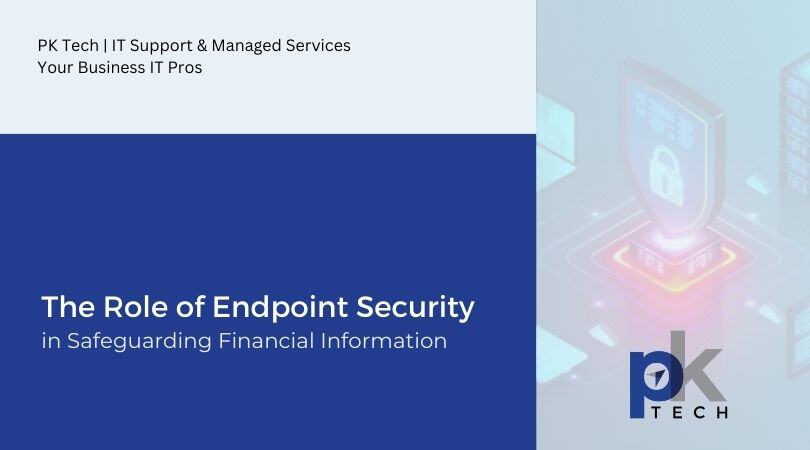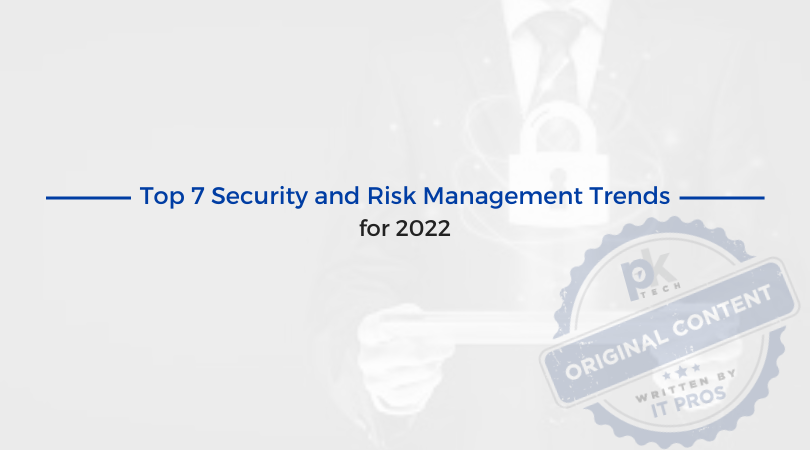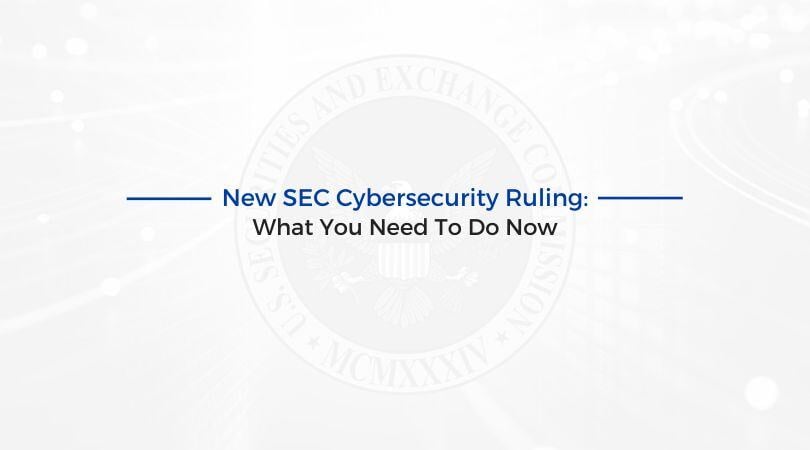Top 7 Security and Risk Management Trends for 2022
Gartner recently identified the top security and risk management trends for the year. Gartner provides expert guidance and tools to enable faster,...
4 min read
PK Tech : March 6, 2025

We’re back with more content on keeping financial information safe. It’s a hot topic, and here’s why: no matter your industry, every business has a subset of financial information it keeps in order to operate. The risk is exponentially greater for some sectors – specifically ones that manage client’s financial information as part of their business operations.
Here’s what we know to be true: cyber threats are becoming more sophisticated, and safeguarding financial information is more critical than ever for businesses and individuals alike. Whether it’s personal banking details, investment portfolios, or corporate transactions, cybercriminals will target anything that leads to money. With the rise of digital platforms, mobile banking, and online trading, endpoint security has emerged as a vital line of defense in protecting sensitive financial information from threats.
If you’re wondering what endpoint security is and why it’s all the hype, you’ve come to the right place.
Endpoint security refers to securing the various devices (endpoints) that connect to a network, such as laptops, desktops, smartphones, tablets, and even Internet of Things (IoT) devices. These endpoints act as entry points into a network, and when compromised, they can provide cybercriminals with access to sensitive data.
Endpoint security involves a combination of software, hardware, and policies that work together to detect, prevent, and respond to malicious activities. It typically includes antivirus programs, firewalls, intrusion detection systems, encryption tools, and more. Given the proliferation of devices connected to corporate and personal networks, adequate endpoint security has become indispensable in protecting financial information.
As a business, it can seem like your cybersecurity's “critical” components continue to grow and expand. We get it. What it takes to adequately and proactively protect your business is constantly changing (and, yes, expanding, in some cases). The threats are growing and becoming more significant; thus, the defense must be.
Here’s why endpoint security matters specifically for protecting your business’ financial data:
Cybercriminals know that financial data is valuable. Personal financial information, credit card details, and sensitive corporate financial records are all highly sought after for theft, fraud, or blackmail. Attacks targeting endpoints, such as phishing emails, malware, or ransomware, can give attackers access to this data.
For example, a seemingly innocent email with a malicious attachment can infect an endpoint with malware, allowing cybercriminals to spy on users, steal login credentials, or install ransomware that locks financial data until a ransom is paid. Without robust endpoint security, these attacks can go unnoticed, giving attackers the time they need to access and exfiltrate financial information.
The shift to remote work, coupled with the widespread use of personal devices (BYOD), has made endpoint security even more critical. When employees access company financial systems or use personal devices to manage finances, those endpoints are vulnerable to cyber threats. Without proper endpoint security, malicious actors can exploit vulnerabilities in employee devices and access sensitive financial data more easily.
Organizations that support remote work or BYOD policies must ensure that their endpoint security strategies extend beyond the corporate network, securing devices from home offices, public Wi-Fi, and even devices that employees use while traveling.
Financial institutions and businesses handling financial data are subject to stringent regulatory requirements, such as the General Data Protection Regulation (GDPR) in Europe, the California Consumer Privacy Act (CCPA) in the United States, and the Payment Card Industry Data Security Standard (PCI DSS).
One of the key principles of these regulations is data protection, and endpoint security is a crucial component of a company’s overall security posture to ensure compliance. If sensitive financial data is compromised due to a lack of endpoint security, it can result in fines, lawsuits, and damage to a company’s reputation.
Endpoint security tools often include data encryption capabilities that protect sensitive information, such as financial records and transaction data. Encryption converts data into unreadable formats, which can only be decrypted with the right key. If an endpoint is compromised or a device is lost or stolen, encrypted financial data is much harder for attackers to exploit.
Additionally, secure transactions are paramount in online banking, e-commerce, and financial trading. Endpoint security solutions can protect users from man-in-the-middle attacks, where attackers intercept and alter communication between clients and financial institutions. By securing endpoints, businesses and individuals can ensure that their financial transactions remain private and tamper-proof.
Not all threats come from external actors — insider threats are just as dangerous. Employees, contractors, or partners with access to sensitive financial data can intentionally or unintentionally compromise this information. Without endpoint security measures like monitoring, access control, and activity logging, tracking who accessed what data and when is challenging.
For example, an employee working remotely could inadvertently download malicious software onto their device, which then spreads across the network, compromising financial information. Endpoint security helps minimize the risk of these internal threats by providing layers of protection, monitoring, and auditing capabilities.
To effectively protect financial data, endpoint security solutions must incorporate several critical features:
Real-time monitoring is essential to identify potential threats as they occur. Sophisticated endpoint security tools use machine learning and artificial intelligence to detect unusual behaviors and potential risks in real time. For example, if an endpoint starts accessing financial data at odd hours or if an employee clicks on a suspicious link, the system can automatically flag the activity and take action, such as blocking the device or alerting the IT team.
Multi-factor authentication adds an extra layer of security when users access financial systems. This requires users to provide additional verification beyond just a password, such as a fingerprint scan, a one-time code sent to their phone, or a facial recognition scan. MFA reduces the risk of unauthorized access to financial accounts, even if an attacker has compromised an endpoint device.
Encryption ensures that sensitive financial data remains unreadable without the decryption key. If an endpoint is lost or stolen, malicious actors are far less likely to exploit encrypted data. Endpoint encryption is especially important for businesses that store or transmit financial data across various devices, ensuring the data remains protected at rest and in transit.
Vulnerabilities in outdated software can be exploited by attackers to gain access to financial data. Endpoint security solutions should include patch management capabilities that automatically update software, operating systems, and device applications to close security holes and prevent exploitation.
For businesses managing multiple endpoints, centralized security management helps streamline and enforce security policies across the network. Administrators can monitor endpoints, update security measures, and ensure that all devices comply with real-time security protocols, making safeguarding sensitive financial information more manageable.
Endpoint security is not just a technical necessity – it’s an essential safeguard for protecting financial information from cyber threats. By implementing comprehensive endpoint security solutions that include real-time threat detection, encryption, multi-factor authentication, and more, organizations can greatly reduce the risk of financial data breaches and ensure that sensitive financial information remains safe and secure.
As cyber threats evolve, endpoint security will play an increasingly important role in defending against attacks and ensuring compliance with regulatory standards. If your current cybersecurity strategy does not include endpoint security, it’s time to up your game.
Our team at PK Tech would love to chat with you. We provide managed IT services to small to medium-sized businesses across a range of industries in the Greater Phoenix Area. Schedule a time to chat with our team here.

Gartner recently identified the top security and risk management trends for the year. Gartner provides expert guidance and tools to enable faster,...
-1.jpg)
The National Institute of Standards and Technology (NIST) recently released a draft of its Digital Identity Guidelines, known as NIST SP 800-63. This...

If you are a public company subject to the reporting requirements of the Securities Exchange Act of 1934., listen up. The Security and Exchange...